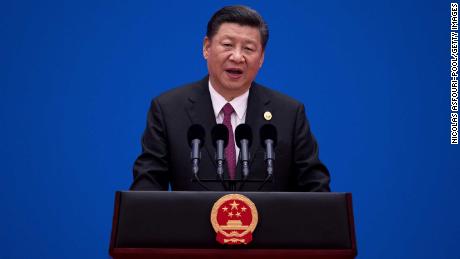Beijing (CNN)"Everything I do is for the poor masses of this Earth!" bellows the deep voice over bombastic classical music.
This is Karl Marx, but not as you know him: dashingly tall, with a pronounced jawline, suave brown curls and blue eyes, and speaking Chinese -- a world away from the German philosopher's typical image as an old man with a bushy white beard.
"The Leader," a seven-episode anime documenting the life of the "Communist Manifesto" author, premiers January 28 on China's largest video-streaming website, Bilibili.
It is the latest production to come out of the Propaganda Department of the Communist Youth League, in association with the party's Central Office for the Research and Construction of Marxist Theory.
Set in 19th-century Europe, the series covers Marx's life between 1818 and 1883, including the period in which he published some of his best-known works such as the "Communist Manifesto," "The Eighteenth Brumaire of Louis Napoleon" and the first volume of his masterwork, "Capital."
The official trailer depicts Marx and his future wife, Jenny Von Westphalen, playing as children, while promotional images show a grey-haired, bearded but still dashing Marx standing next to an equally aged and handsome Friedrich Engels, his longtime collaborator and the man who did more than anyone to popularize Marx's works after his death in 1883.
A whole array of spin-off products has emerged even before the first episode of "The Leader" has premiered, including a comic book, Marx and Engels emojis, and stage plays based on the anime.
Wu Yunqin, who edited the comic book, told the state-run Global Times it informs "young readers that Marx is not only a great thinker as they learned in textbooks, but also a diligent, romantic and rebellious teenager."
Jiang Siyi, a 24-year-old master's student at Peking University and member of the Chinese Communist Party, told CNN the anime was a "really interesting experiment."
"A lot of young Chinese think the government's previous methods of propaganda were too dry, meaning they have no interest in gaining a profound understanding of Marxism," Jiang said.
'Marx got it right'
Last year marked 200 years since Marx's birth, an event accompanied by a major propaganda push from Chinese officials, who have previously struggled to connect young people raised under China's more market-based economy with the country's founding principles.
In October 2017, Hunan TV -- one of China's largest television networks -- debuted a talk show centered on panel discussions about Chinese Marxism titled "Socialism is a Bit Cool."
The following year, state broadcaster CCTV ran a five-episode show "Marx Got It Right," aimed at educating young Chinese on the relevance of Marxist thought in modern-day China.
However putting that thought into practice is less welcome. Last year, authorities in Beijing and elsewhere launched a crackdown on student Marxist organizations.
Alumni and students from Peking and Renmin universities have been detained in the past six months after organizing to support striking workers at a factory in Shenzhen.
Footage also reportedly emerged this week of apparently staged confessions by a number of prominent student activists, including Yue Xin and Shen Mengyu, both of whom disappeared late last year.
While the full anime has yet to be released, trailers for "The Leader" are noticeably quiet on some of Marxism's central tenets, such as class struggle, and seem more in line with the ideology espoused by Chinese President Xi Jinping.
For some young Chinese, the apparent ideological aims of the anime undercut any potential enjoyment.
"The political element is too obvious," said 19-year-old Yi Shuhan, a liberal arts student at Grinnell College, Utah. "The main theme is the party line. It would be the same as a Japanese anime based on Japan's imperial history, it's just ridiculous."







